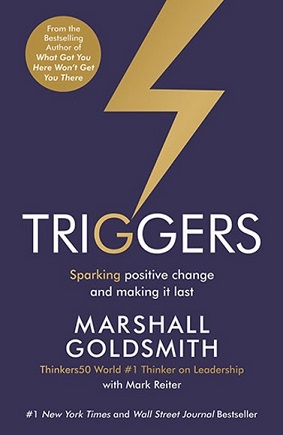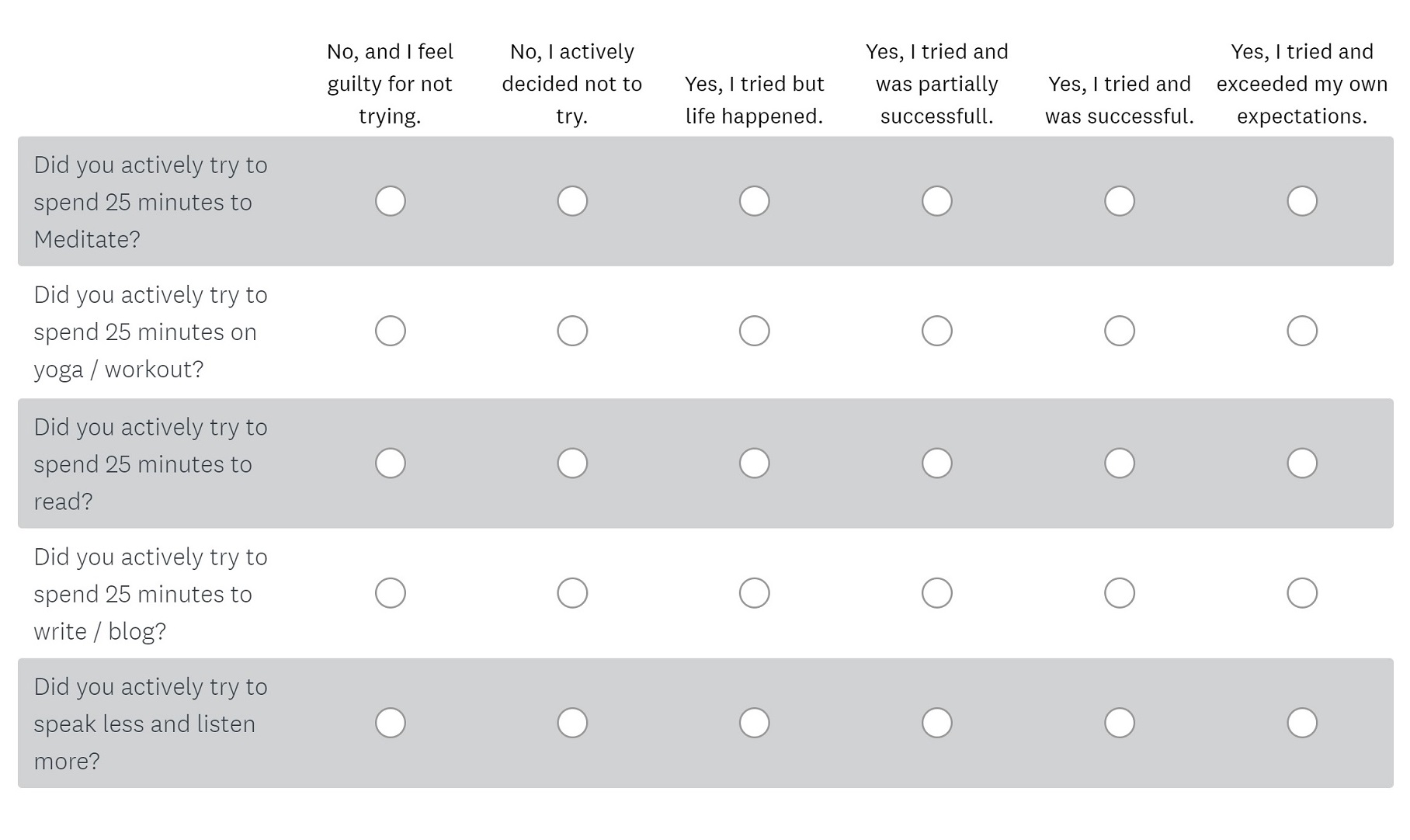Most of us underestimate the influence of our environments on your daily lives. I've done blog posts where I cite books which tell you how your will power is a depleting resource and how relying on your will power is a recipe for failure. Triggers, by Marshall Goldsmith is a book that starts with the idea of how the triggers in the environment around us influence our lives and then takes a thought provoking journey through how you can go from triggers constantly and impulsively influencing your life, to you yourself becoming a trigger for positive change in your own life and the life of others you love.

The book suggests multiple ideas and tools to introduce better mindfulness in your life, to avoid mindless drifting and get better control of your life and your behavior. One tool I found particularly interesting while reading the book was the idea of active questions using a daily questionnaire. The author argues that most of the surveys (and even the questions we ask ourselves) are passive and because they are passive they tend to bring about very little behavior change in our lives.
Marshall explains this through his own study:
In the first study, we used three different groups. The first group was a control group that received no training and was asked “before and after” questions on happiness, meaning, building positive relationships, and engagement.
The second group went to a two-hour training session about “engaging yourself” at work and home. This training was followed up every day (for ten working days) with passive questions:
The third group went to the same two-hour training session. Their training was followed up every day (for ten working days) with active questions:
- How happy were you today?
- How meaningful was your day?
- How positive were your relationships with people?
- How engaged were you?
- Did you do your best to be happy?
- Did you do your best to find meaning?
- Did you do your best to build positive relationships with people?
- Did you do your best to be fully engaged?
At the end of two weeks, the participants in each of the three groups were asked to rate themselves on increased happiness, meaning, positive relationships, and engagement.
The results were amazingly consistent. The control group showed little change (as control groups are wont to do). The passive questions group reported positive improvement in all four areas. The active questions group doubled that improvement on every item! Active questions were twice as effective at delivering training’s desired benefits to employees. While any follow-up was shown to be superior to no follow-up, a simple tweak in the language of follow-up—focusing on what the individual can control—makes a significant difference.
Marshall then goes on to introduce his readers to the idea of active questions that you ask yourself daily. He advices that you appoint a designated coach (could be a relative or a friend) and run through these set of questions with them every night, creating a sense of accountability and mindfulness. You can rate yourself on these questions on the nightly basis (almost like a quick scrum meeting about your own life) and then do incremental improvements over time. I've been doing this using a personal quick and dirty survey for myself for a few days and it works. For example here is one set of personal questions from my overall list of questions I ask myself each night:

Of course there are a few more questions for my professional life, work life and relationships too, but you get the idea. Notice the focus here is on 'trying your level best' (though I seem to also provide some value to the outcome, this is not originally the idea presented in the book).
The simple fact that I would be going through this set of questions every night with a loved one and will be answering these questions honestly, provides me with a the much needed nudge to do my best to be able to answer each of these questions positively. Since this is the first time I am doing this, I am focusing on Mini Habbits with a 25 minute single pomodoro session for each of the things that really matter to me.
Having done this exercise I highly recommend it. If nothing else it makes you a little more mindful about your life and where you are spending it. Marshall promotes an old idea, that the planner within you is literally a different person than the doer within you. And it's easy for the planner within you to think up of grand optimistic plans but it's the doer who has to deal with the environmental triggers and fight procrastination.
What I've discovered is that the right questions, asked in the right way can help bring the planner and doer within you in touch with each other and the realities of daily distractions. When I meet my planners expectations, I'm happy. When I don't, at least I am aware of slipping up and am a little bit more mindful the next day. Active questions that you have a relative, friend or loved one (or even yourself) ask you every day can be an extremely powerful tool if you indulge in the exercise every single day. Go ahead, try it out. I've personally tried it and I highly recommend it.
Comments are closed.